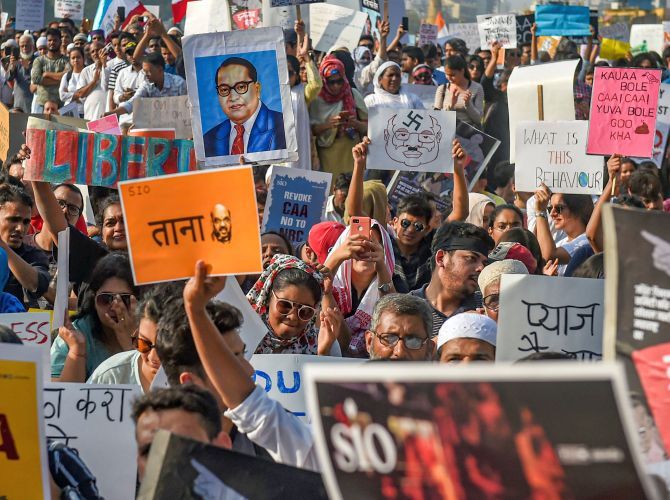 | « Back to article | Print this article |
'Our modern icons have assumed infallibility and think course correction or admission of a mistake as taboo.'
'Much will depend on the sagacity of the national leadership to show humility that our Gods showed.'
'Else, we are doomed in the coming year to divert our attention to firefighting rather than the task of nation building,' warns Colonel Anil A Athale (retd).

As self-goals go, there are very few parallels in recent history to the Citizenship (Amendment) Act passed by Parliament recently.
It is one of those examples where the English proverb 'The path to hell is paved with good intentions' comes to mind.
This ill-considered move can be compared with the UPA regime when on December 9, 2006, Dr Manmohan Singh made that famous statement that minorities have the 'first' right over the nation's resources.
The UPA, in effect, lost the moral majority that day and it needed a person like Narendra Damodardas Modi to vent the anger.
It is noteworthy that once this set the UPA in the public perception as anti-majority, no amount of temple hopping on election eve by its leaders could wash.
No one can have objection to the 'intent' behind the CAA law -- to give shelter to the persecuted minorities from neighbouring countries.
But by restricting this humanitarian gesture only to some and not all persecuted people, the Act has attracted widespread criticism and given a handle to India's detractors.
If only the new law had been faithful to the Hindutva ideology of Vasudheva Kutumbakam (the whole world is one family) it would have given hope to the persecuted Hazara Shias, Kalash people, Ahmadiayas and Ismailiyas of Gilgit Hunza in Pakistan.
Instead, by specifying that persons belonging only to some faiths are acceptable to India, in one ill-considered stroke it has given a handle to Pakistan to point fingers at India and diverted attention from its atrocities against minorities.
It now appears that the advice of many experts, government sympathisers and even supporters, was spurned.
It is this lack of sensitivity and hubris that bodes ill for the coming decade that begins at midnight.
There have been feeble attempts to reassure the Muslim minority that the Act is not targeted at them.
Unfortunately in this case, the perception that this government is against them has not been dispelled.
The RSS chief's often stated statement that he considers 'all 130 crores' as Hindus has fuelled even greater discord.
The reality today is that the term 'Hindu' no longer denotes culture, but is linked to faith.
One cannot blame the minorities if they feel this as an imposition. In the Bhagavat Gita, Lord Krishna warns against this kind of imposition (chapter 18, verse 67). It is this facet of Hinduism that sets it apart from other faiths and makes it both tolerant and non-threatening.
Leave alone Muslims, even persons of Indic faiths like Sikhs, Jains and Buddhists do not accept this definition.
The RSS and its leadership could well use the more acceptable term 'Bharatiya', but it is a matter of hubris that even this sensible move is not undertaken.
The term 'Bharatiyata' actually accurately reflects the 'cultural nationalism' that these organisations claim to be their credo, yet stuck in the complexes of an earlier era when the term 'Hindu' was a form of abuse, they refuse to change with time.
The fundamental reality of India is that it is a three in one nation: Bharat, Hindustan, India.
In the popular terms of 1980s, India is an 'Amar, Akbar, Anthony' nation.
Bharat represents the ancient Indian civilisation largely based on the Hindu ethos.
Hindustan represents the mosaic it has now become with a plurality of faiths that includes Buddhism, Jainism, Sikhism, Islam and Christianity.
India represents the modern Westernised face of the country.
India can only be governed by keeping a healthy balance between all three strands of Indian nationalism.
In recent history, the 2004 to 2014 decade can be described as domination by Hindustan and India at Bharat's expense.
The rulers went to ridiculous lengths to deny legitimacy to India's past.
A classic example was the infamous affidavit by the then government denying the historicity of the Ramayan to please its constituents of Hindustan.
The Westernised elite dominant in New Delhi saw India's ancient past as an embarrassment.
Since 2014 the tables have turned. Now there is a tendency to claim that ancient Indians knew 'everything' and a pseudo-science like astrology is taken seriously.
It is understandable as a reaction to the earlier suppression and oppression, but having been in power for last six years, some of that anger and reaction ought to have been diluted by time.
India faces many daunting tasks on the economic and security fronts and can ill afford a conflict between Bharat and the Hindustan/India combine.
A way out of this could be a re-think on contentious political and social issues.
But in our changed ethos, even mild criticism of modern icons seem to attract violent reactions.
This is totally contrary to our ancient Indian ethos.
Our own Gods like Ram and Krishna, when in human form or as avatars, are shown to have character flaws.
In the case of Ram, his slaying of Bali or abandoning of Sita is accepted as a reality.
As is Krishna's many acts in the Mahabharat war.
But our modern icons have assumed infallibility and think course correction or admission of a mistake as taboo.
Much will depend on the sagacity of the national leadership to show humility, that our Gods showed.
Else, we are doomed in the coming year to divert our attention to firefighting rather than the task of nation building.
Colonel Anil A Athale is a military historian and a frequent contributor to Rediff.com.